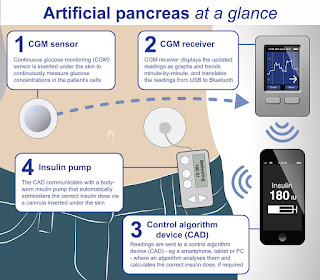Scientists are working to create an artificial
pancreas that will help reduce the
complications of type 1 diabetes and
significantly improve the lives and life
expectancy of millions of patients with the
condition.
Product development firm Cambridge
Consultants recently announced that it is
teaming up with the Institute of Metabolic
Science (IMS) at Addenbrooke's Hospital in
Cambridge, UK, on this groundbreaking
research.
The U.S. ranked 6th highest in the world for
the rate of kids aged 14 and under diagnosed
with type 1 diabetes , according to research
from the International Diabetes Federation.
The risk of diabetes patients dropping into
dangerously low blood sugar levels while
sleeping is especially concerning.
An application is being created by Cambridge
Consultants that will enable a continuous
glucose meter (CGM) to autonomously convey
messages to a smartphone or tablet via
Bluetooth and then link to an insulin pump.
This will allow patients with type 1 diabetes to
wear an artificial pancreas at home without
being supervised by a nurse.
Every 1 to 5 minutes, the CGM will monitor
the patient's glucose levels. That information
will then be transmitted to a connected
smartphone or tablet that will measure the
amount of insulin needed to keep the person's
glucose at a steady level at all times.
The appropriate dosage will then be
automatically given to the patient through a
pump worn under the patient's clothes.
Although experts have previously tested a
nurse-assisted system in a hospital setting and
a home use of the system has already been
established, the application now being created
provides Dr. Hovorka, research leader, with
the tools necessary to test his novel algorithm
in a home environment over a longer time
period.
Dr. Hovorka, director of research at the
University of Cambridge Metabolic Research
Laboratories, which are part of the IMS, said:
"Researchers in my field have been working on
a number of different algorithms for an
artificial pancreas but, with the help of
Cambridge Consultants, I hope to create a
system that is convenient to use and can be
remotely monitored."
The next step in making the system more
extensively available is to try out the
system in a natural setting over a longer
time period .
"To do this, it must work completely
autonomously. Combining my background in
mathematical modeling and developing control
algorithms, and Cambridge Consultants'
extensive experience in medical technology and
connected devices, we hope to make a huge
breakthrough in the day-to-day control of this
incurable condition," he explained.


Comments
Post a Comment